


In these cases, you should put the clothing you have worn directly into the washing machine and clean them immediately. Experts assure that regular detergents will be capable of killing the virus, but to learn more about disinfecting your clothes with COVID-19 in mind, consider reading the article Safe Laundry Instructions from Healthcare Experts.

Still, doctors consider shoes a low-risk item, and that’s because we rarely make face contact with our shoes, why would we? Similarly, most people wouldn’t put their shoes on a table or the kitchen counter either, from which germs could potentially travel to your mouth through food. If, however, you have kids or pets at home, and you worry about them not being careful enough with handling shoes, follow these tips:
1. Clean your shoes with alcohol wipes or soap and water after using them.

What Is 'Long COVID' and Why Do You Need to Know About It?
You have heard of the term 'Long COVID' in recent times. This article explains everything you must know about the unique condition.

UPDATE: Who’s More Likely to Get a Severe COVID-19 Case?
The CDC extended the list of categories of people extremely susceptible to developing a severe Covid-19 infection, here's what you need to know

COVID-19 Vaccine Update: Pfizer Vaccine Is 90% Effective
The Pfizer and BioNTech Covid-19 vaccine promises to be 90% effective, but what else is known about this vaccine and when should we expect it?

COVID-19: Should You Worry About Food Contamination?
In this article, we answer 5 common food safety-related Covid-19 questions with the latest scientific data in mind.

The Role of Zinc in Predicting the Severity of COVID-19
There is some evidence suggesting that a zinc deficiency increases one's risk of severe COVID-19. Here's what you need to know.

Cloth Masks Aren’t Everlasting: Learn When to Replace Them
Knowing when to replace a cloth mask is essential, as an old face mask can be less effective. These 5 signs tell you it's time to replace a cloth face mask.
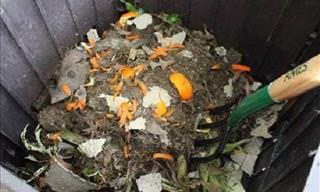
Enrich Your Soil with This Easy-To-Make Compost
Enrich your soil and provide your plants with all the nutrient that they need by making this compost.

Surprising Ways to Use ChapStick You Might Not Know About
Here are some of my favorite uses for this unassuming household product.

50 Great Kitchen Hack That Everyone Should Know About
Spending time in the kitchen makes you realize that you can do things a lot quicker than you thought possible. Let me share my tips with you.
 14:01
14:01
I Never Imagined You Can Use Coca-Cola to Do These Things!
A bottle of Coca-Cola goes a loong way, it turns out! From tenderizing meat, to cleaning jewelry & repelling bugs, the magic drink can do it all!

Why Buy Candles When You Can Make Your Own at Home?
Why spend money on expensive candles when you can easily make your own? This guide will show you how.

Experience the Beauty Benefits of Palo Santo Oil: DIY Tips
Find out the amazing beauty benefits of Palo Santo essential oil for your skin and hair.
 1:30
1:30
The Trick to a Perfect Flower Arrangement is Amazingly Easy
Sometimes, the simplest ideas yield the best results - A simple trick that makes flower arrangement as easy as pie!
 2:00
2:00
If You See a Baby Choking, Do You Know What To Do?
If you see a baby choking, do you know what to do? This guide explains.

Bored of the Outlet Covers? Here's How to Paint Them Well
In this article, we'll learn how to paint and wallpaper plastic or metal outlet covers effectively and professionally.

20 Incredibly Helpful Things You Can Do With Vinegar
Here are some great tips on how to use vinegar around the house. Try out some of these solutions and vinegar will never just be a salad dressing again!

14 Fall Plants Perfect for Brightening Up Your Garden
These 14 perennial flowers can be enjoyed long after summer has ended, and just look at how beautiful they are! How will they look in your garden?
 8:26
8:26
DIY Corner: A Cool Technique for Christmas Decorations!
This is how you can use packing tape to make a sticker out of anything. Sounds too easy? It truly is!

10 Tips for Cleaning With Salt - Number 8 is My Favorite..
Salt can be found in every home, but besides for cooking, it is efficient and useful for cleaning. Here are 10 effective ways to use salt for cleaning.
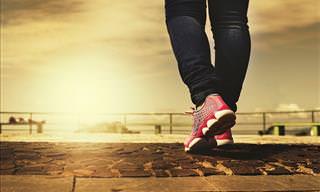
Step by Step – Learn 36 Interesting Facts About Walking!
What are the benefits of speed walking and how long would it take to walk around the planet? Learn this and much more now!
 4:51
4:51
6 Common Mistakes You're Likely Making When Cracking Eggs
These are the biggest mistakes people make when cracking eggs.

Save Money with These 15 Great Fuel Economy Tips
These 15 great tips will help improve your fuel economy, saving you money in the process.

6 Great Benefits of Waking Up Early
Do you promise yourself that you'll wake up early the next day, but at the moment of truth you hit the snooze button? Stop this with these 11 tips!

10 Tips to Washing Your Car the Right Way
Here are a few tips on how to effectively wash your car without damaging the paint or leaving marks.

Experts Warn Against Ordering These Foods at Restaurants
According to the experts, you should avoid ordering the following 8 foods at restaurants. You'll want to heed their advice.

Give Your Feet a Treat With This Great Homemade Foot Soak
This simple, homemade foot soak uses only two ingredients to ensure your feet look and feel great!

Here's How You Can Tell If Someone Is Lying to You
No one likes a liar, but thankfully, if you know how to read body language, you can tell if someone is lying to you.

Have You Been Using Antiperspirant All Wrong?
Do you apply antiperspirant correctly? Here's an article that will teach you everything about proper antiperspirant application
 8:29
8:29
This Seed Can be Planted as Late as November!
Sad to be parting with your outdoor garden during the winter months? This seed can be planted as late as November!
 17:01
17:01
Maximize Bedroom Space With These Furniture Designs
Here is a look at some incredible furniture designs that will help maximize bedroom space.
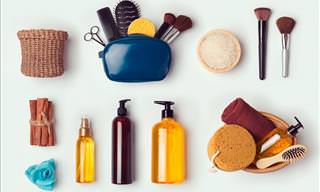
Why You Shouldn’t Keep a Bar Soap for More Than 2 Years
The following 10 personal hygiene products all expire sooner than you’d think and you must replace them regularly
 1:34
1:34
IMPORTANT: Why You Should Wipe Down Your Phone Every Night
What exactly is lurking on your phone, and how should you go about cleaning it?

10 Reasons Why Your Nonstick Cookware Is SO Short-Lasting
Here are 10 common cooking and maintenance mistakes that can ruin nonstick cookware for you to avoid in the future!

12 Common Cooking Mistakes and How to Fix Them
Cooking can be fun or a headache, it all depends on how we work in the kitchen. Learn the12 mistakes most of us make while cooking and how to fix them.

10 Popular Beauty Products That Are a Waste of Money
Some beauty and self-care products are just a waste of your money, and all 10 of these popular items are better off in the trash...

Use This Genius Method to Revive Dirty White Socks
In this article, we’ll show you how to remove the dirt, the staining, and the greyness from white socks with regular home supplies.
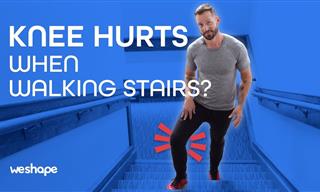 8:40
8:40
How to Beat Knee Pain While Going Up and Down the Stairs
Knee hurts while climbing stairs? These tips might just help.

How to Start a Garden on a Windowsill
No green thumb is needed for this simple gardening project.

Mold Will Be a Thing of the Past With These Home Remedies
Mildew and mold are pesky household invaders. Here are 5 easy ways to get rid of them using just natural household ingredients.
 1:32
1:32
Ease Your Neck Pain with This Secret Pressure Point
Looking down at our devices all day can cause pain in your neck. This pressure point can help alleviate it.

7 Important and Surprising Uses for Hand Sanitizer
As hand sanititzer has become a household staple now, here are 7 surprising handy uses of it you should know

A Coffee Filter Can Be the Most Helpful Item in the House...
Don't let their name fool you - coffee filters are some of the most useful things you can have around the house!
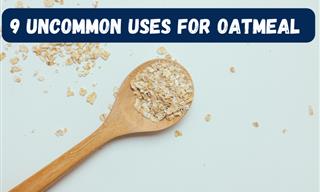
9 Uncommon Ways to Use Oatmeal in Your Home
Oats are so useful outside the kitchen too!

How to Become Wiser in 6 Simple Steps
Intelligence is something, some say, we are born with. On the other hand, wisdom, which is far more useful, is definitely something one can accumulate over a lifetime. Many search for ways to become wise, but few feel they have really achieved it. Ch

10 Natural Home Remedies EVERYONE Should Know!
Not Feeling well? We recommend that you think outside the box, or in this case outside the medicine cabinet with the following 10 effective natural medicines!

How to Make an Effective Cough Remedy Using an Orange!
Oranges are a great source of vitamin C that helps strengthen the immune system, but did you know there is a way to make it an effective cough medicine?

12 Great Advantages of Being Bald
You thought hair loss and going bald was a BAD thing? Well, think again, as we go over everything that's great about being bald!


